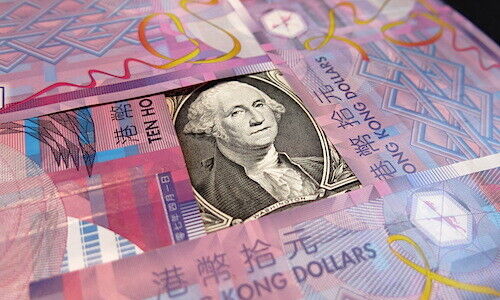Hong Kong Dollar Peg Tests Another Round of Doubters
US-China decoupling, weak growth and shrinking reserves have led to fresh doubts about the sustainability of the Hong Kong dollar peg. Will the city’s linked exchange rate system survive this round of doubters?
Last week, Pershing Square Capital Management founder Bill Ackman announced that he was betting against the Hong Kong dollar and its US dollar peg, citing worsening US-China decoupling as a driver.
«We have a large notional short position against the Hong Kong dollar through the ownership of put options. The peg no longer makes sense for Hong Kong and it is only a matter of time before it breaks,» Ackman said in a social media post.
«In light of the US/China decoupling of recent years, we find it particularly surprising, almost embarrassing, for China to continue to peg the HK dollar to the US dollar,» he added in a another post that has since been deleted.
Not Alone
Ackman is not alone in his doubts about the Hong Kong dollar peg. In one of his social media posts, he cites a «Bloomberg» commentary authored by ex-Citi Private Bank chief investment officer Richard Cookson, who details concerns about Hong Kong’s shrinking foreign reserve as a reason for the peg to become «untenable».
«Call me old fashioned but a government clearly in need of cash and a chunk of assets whose value has probably further to fall make it rather likely that the Exchange Fund’s assets have further to shrink — and that the reasons for that will put still further pressure on the peg,» said Cookson.
«However unlikely de-peg may be, the payoff of upwards of 200:1 is comparable to CDS payoffs for the default of co’s like IBM over the same [6-month] horizon,» tweeted hedge fund manager and Saba Capital Management founder Boaz Weinstein in support of Ackman's trade, calling it a «smart lottery ticket». «Nothing is impossible, but only one of these is at all plausible.»
Winning Streak
Since 1983, the Hong Kong dollar has been pegged to the greenback and successfully defended against multiple rounds of attacks. Notable investors against the peg include George Soros in 1998 and Hayman Capital Management founder Kyle Bass in 2020 during the height of political unrest in Hong Kong, in a strategy with 200 times leverage.
Even for Ackman, this is not his first time wagering against the peg after betting in 2011 that the Hong Kong dollar would appreciate due to being «materially» undervalued.
«It's nice to finally have others agreeing with our thesis. Rigid currency pairs harnessed to asynchronous economies are destined to fail,» Bass said in «Reuters» report in response to Ackman's latest bet. «One bad day of deposit/currency outflows will likely bring unimaginable stress to the situation.»
Bank View
Still, banks remain positive that the Hong Kong dollar peg will remain in the foreseeable future.
«Although maintaining a peg could at times bring short-term headwinds to growth, we believe it remains the optimal arrangement for Hong Kong in the longer term,» according to a Morgan Stanley research note authored by economists Helen Lai, Jenny Zheng and Robin Xing, highlighting that the yuan was not yet fully convertible.
«Conditions are not favorable for selling Hong Kong dollar which will suffer negative carry,» added DBS strategist Carie Li. «The Hong Kong government also shows no intention to change the system.»
Government Defense
And as usual, local authorities continue to vehemently defend the exchange rate policy.
«If you bet against the Hong Kong dollar, you are bound to lose,» said financial secretary Paul Chan in a speech at the city’s global banking summit earlier this month. «You can verify my advice with certain hedge fund managers in the US who have been wrong about Hong Kong dollar time and again.»
«Up until moments before a currency peg is lifted, the sovereign always asserts that they will never lift their peg. Peg defense 101,» Ackman added.



























